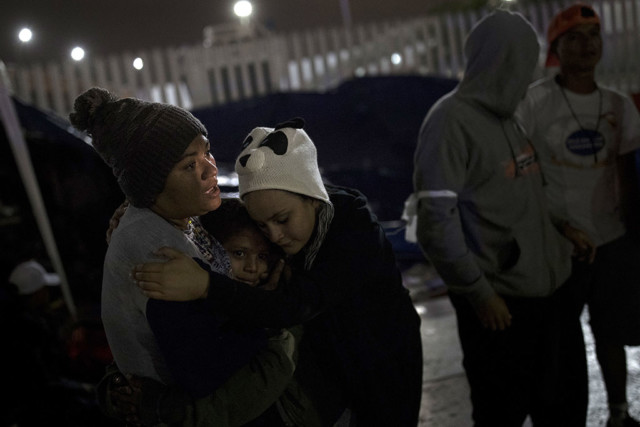Organizers working with a group of Central American migrants, gathered at Mexico’s border, said a total of 74 people have now crossed into the United States to formally request asylum. Nearly 200 migrants in all arrived at the border Sunday. While some have accepted Mexican offers of shelter, others remain committed to making their U.S. appeal. CGTN’s Alasdair Baverstock reports from the border.
As the Central American migrant caravan languishes at the U.S. border, uncertainty remains the overwhelming factor.
The first small group of migrants was ushered through to plead for U.S. asylum Monday night, and others have followed. But for those who remain, no one can say how long the wait might be.
But support is at hand, from a concerned group of San Diego volunteers, called the Border Angels.
“So I have the opportunity to come by, drop off things, and cross the border safely, you know, so I feel like I have the responsibility to do so,” Jorge Sanchez, a Border Angel said. “Also in solidarity, I’d rather be here at least one night, or maybe two, or however long I can be instead of staying at home and watching it on TV.”
Since 1998, the Border Angels have taken an active role in helping illegal migrants on their journeys to cross the border. The group became well-known for its delivery of what can be life-saving supplies… jugs of water, packs of food, left at points in the open desert known to be frequented by illegal crossers.
They are led by Enrique Morones, who founded the group.
“The way that we have been helping them is that we give donations for them, to be there, to be prepared with blankets and supplies that they might need, and we have also had members of the border angels join them at certain points, and we have also contributed financially as well.”
Despite this show of support from some American citizens, immigration attorneys in San Diego, across the border from Tijuana, hold out little hope that the migrant caravan can remain in the US, even if they are initially allowed in.
“So their chances of their winning the asylum, in my opinion, are low, very, very low,” James Rudolph, an immigration attorney said. “They still get to see an immigration judge, and a lot of them will stay detained, and it can take six months to a year for the asylum process to play out.”
Those who remain, said going back to Central America, and the violence that drove them out is not an option.
After four days at the border, some members of the caravan have accepted the Mexican authorities’ offer of migrant shelter housing in Tijuana. So the caravan’s unity – its strength in numbers which got them this far, has fractured somewhat. The question now is what impact this will have on those who remain, determined to seek U.S. asylum.
 CGTN America
CGTN America
 A mother and her daughters stand in an embrace as they join others in a prayer service led by a volunteer pastor at the El Chaparral U.S.-Mexico border crossing, in Tijuana, Mexico, Monday, April 30, 2018, where the caravan of Central Americans seeking asylum in the United States have set up camp. (AP Photo/Hans-Maximo Musielik)
A mother and her daughters stand in an embrace as they join others in a prayer service led by a volunteer pastor at the El Chaparral U.S.-Mexico border crossing, in Tijuana, Mexico, Monday, April 30, 2018, where the caravan of Central Americans seeking asylum in the United States have set up camp. (AP Photo/Hans-Maximo Musielik)
